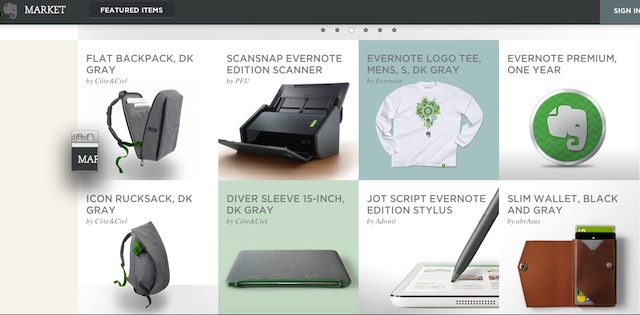Evernote, the popular note-taking app with 75 million users, today unveiled the latest chapter in its bid to become the go-to place for people to store all their memories — a decisive move into physical merchandise.
It’s entering a partnership with 3M and its Post-it note brand to develop a special line of notepads and a camera to take notes, record them, and then seamlessly transfer them into Evernote’s platform. That news was actually leaked last night, but today Evernote went one step further, announcing that these products and more will now be sold through a special online shop, called Evernote Market. (The company says the market will also be available in its desktop and mobile apps.)
The announcement is being made on-stage at Evernote’s EC3 conference in San Francisco. CEO Phil Libin said that it might seem “weird” for the company to get into physical products, but he noted that the company teamed up with Moleskine last year to create a special notebook with features to make it easier to digitize notes in Moleskine’s pretty leather notebooks.
“Paperless is not the goal — great experience is not the goal.” Libin said, later adding, “We want to eliminate the stupid uses of paper, but we want to extend the great uses.”
Other products that will be new to the market in addition to the Post-it products are devices from ScanSnap and Adonit.
ScanSnap’s Evernote Edition, the company says, is the result of a collaboration with ScanSnap “to marry hardware speed and precision with Evernote’s organization and sync features.” It says it will be the most advanced scanner-to-service integration on the market.
Meanwhile, the Jot Script Evernote Edition Stylus from Adonit is “the first and only fine point stylus on the market, and optimized to work with Penultimate, Evernote’s award winning handwriting application.”
And Evernote is also unveiling a line of lifestyle products that don’t really have a strong tech angle but are customized with company branding. Those include the Evernote Rucksack and Evernote Flat Pack from Côte&Ciel. And there are socks! It’s a real soup-to-nuts approach.
Think of what Evernote is doing as the enterprise-y version of the same strategy that has been embodied by consumer brands like Disney and Rovio’s Angry Birds. Or even the same concept of vertical integration embodied by companies like Apple. The idea is that physical products not only extend the brand of the bigger company. But it will also give users more ways of tapping into Evernote and making it more used, and useful.
Judging by the fact that Rovio itself projects to make more revenue from merchandising than it does from its actual games — and Apple, of course, makes vastly more profit from its hardware than it does its services — this could end up being a smart move for Evernote. To date, the company’s biggest revenue streams come from people who pay for its premium apps. This gives the company a more diversified monetization strategy longer term.
Evernote VP of Product Jeff Zwerner said that as the company looks at physical integrations, it follows five broad principles — giving physical products a digital future, balancing life and work, bringing “global finds” to users, incrementally improving essential products, and designing software and hardware together.
“That’s right, we’re a fashion brand now,” Libin said. “No one saw that coming.”
Update: After the keynote, we asked Libin if, given today’s dramatic expansion of the Evernote brand, there are things that the company definitely won’t do. He replied that he’s committed to monetizing “directly,” not “indirectly,” which means that Evernote won’t run advertising. (Libin described the agreements behind the products in the Evernote Market are straightforward revenue sharing: “We have a very non-creative approach to deals.”)
He also said that Evernote will remain an “introspective” company by not delving too deeply into social features — it will be making some business collaboration announcements tomorrow, but they’re supposed to “make your interactions as efficient as possible so that you can just get on with being productive.”
The broad vision for these kinds of partnerships, Libin added, is to turn Evernote into the “Nike of the mind” — namely, the big brand name that consumers associated with the mind.
When asked about how he’s looking at a potential IPO, he emphasized that he sees it as a “refueling” stop for the company, not an end in an of itself Libin said, “Yes, I think we should go public, but that’s not the goal. … It will be years in the future.”
I also spoke to Moleskine CEO Arrigo Berni, who cited the Evernote partnership as an example of how things aren’t just “digital digital digital” and “paper paper paper.” Instead, he said there’s a continuum between the two. The partnership has already generated a business that has 4.5 million euros in retail value, and that’s with only few types of notebooks (as noted above, there are varieties in the works). Berni said Moleskine is now pursuing other partnerships to move into the digital world, such as its collaboration with FiftyThree, the makers of the Paper app.
